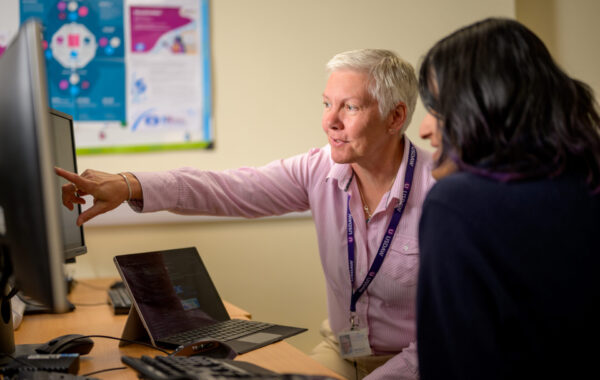As the dust settles after the launch of the new Essential Digital Skills Framework, I’m reflecting on the subtle shifts and changes in the language that we use around digital learning in our society and how we can take forwards this vital piece of work across the UK.
Language matters
There was much debate around the proposed changes to the original 2015 ‘Basic Digital Skills Framework’ (BDSF); and indeed, we’ve seen the shift from the use of the word “Basic” to the use of the word “Essential” for that first layer of learning.
As a digital inclusion charity[i], we have always advocated that those very ‘starter-level’ or ‘foundational’ digital skills sit somewhere beneath the formal educational and qualifications frameworks in the United Kingdom.
The skills needed to engage in our modern, tech-enabled society (including using a smartphone, tablet, laptop or home computer) aren’t always best taught in a six-week training course or a one-off lesson. Those formats don’t necessarily work for the people we’re ultimately trying to help.
Importantly, some of those skills may need to be revisited time and again before they stick: using a mouse, tapping, swiping, pinching, clicking and scrolling – it can take time for some people to build confidence and embed these skills. We think it’s vital that continued support is available through trusted intermediaries (we’d call them Digital Champions[ii]) to help this process along.
Whilst using ‘Basic’ to describe these skills was a decent fit, there was some concern expressed during the BDSF consultation about the word potentially being derogatory. The choice of the word “Essential” is a subtle but important change. ‘Essential’ indicates a broader necessity for the skill set and makes it sound somewhat indispensable. Which we like!
The journey of the Skills Framework
So now we have it, the new Essential Digital Skills Framework (EDSF) has taken our collective understanding of this area to the next level — and it has been quite a journey to get to this point:
- 2015 – the Basic Digital Skills Framework (BDSF) was created by Go ON UK (an organisation founded by Baroness Martha Lane Fox to promote awareness and adoption of digital skills in the UK)
- 2016 — Go ON UK was subsumed and transformed into doteveryone (a think tank “fighting for a fairer internet”), who took over the hosting of the BDSF.
- 2017 – doteveryone announced that they would be passing the BDSF to The Tech Partnership: a network of employers collaborating to create the skills for the UK digital economy.
- 2017 (October) — the Tech Partnership announced that they would be closing down operations in September 2018.
- 2018 — the Tech Partnership announced a consultation on a refresh of the Framework…
Who will lead now?
As of May 2018 we knew the result of the consultation (the resulting EDSF) — but the Tech Partnership are yet to announce where it will live after September 2018 and who will take care of it after they close down.
What we do know is that conversations have been happening (we’ve been in a few ourselves!) and the end game (or ‘next game’) for the EDSF will very likely be to sit within UK Government departments, with the Intellectual Property rights of the Framework being handed to The Crown, ergo The Department for Education.
We know that the Department for Education in England are making noises about using the Framework as the foundation of their national digital skills standards and that the Department for Digital, Culture, Media & Sport (DCMS) are saying that the new Digital Skills Partnership (and Local DSPs) will be the go to ‘vehicles’ for collaboration around digital skills and digital inclusion, from the very basic digital skills that support inclusion, to the digital skills we increasingly need for work.
Sounds OK, right? So why am I worried?
Our experience as a charity operating in this space since 2000 has been that in England, the ownership and leadership of the digital skills agenda changes far too frequently to allow us to come together and really get behind a strategy to drive and embed change.
Back in 2004 we expressed our concern about the lack of leadership and join-up around digital inclusion within UK government and the agencies set up or tasked with delivering the agenda. While 14 years later the world of digital inclusion has come a long way, the sense that ownership and leadership could be passed from pillar to post has not entirely gone away.
Four nations in a digital groove
In the 2018 ONS Internet Users Survey, Northern Ireland remained the region with the lowest recent internet use. Up to 2017, Northern Ireland, Wales, Scotland and the North East of England made up the four regions with highest number of people who had “never used” the internet (in 2018 the top four are Northern Ireland, Yorkshire & The Humber, the North East and the West Midlands).
We have no doubt that some of our most digitally excluded people and communities are located in the deep rural areas of Wales, Scotland and Northern Ireland.
However, these Governments have made what I think are some reliable commitments to the digital inclusion agenda. There appears to be a greater continuity of people overseeing the issue, giving time for digital inclusion partnerships to form based on trust and mutual understanding — and ultimately to deliver sustainable change.
- The Northern Ireland Executive (led by NI Direct for many years) seems poised (if not immersed already) to make some pretty critical improvements to government services — including Digital Inclusion as a key Enabler for its work.
- Scotland has a robust strategic approach to digital participation, which puts money ‘where its mouth is’ and empowers the Scottish Council for Voluntary Organisations to lead on the inclusion agenda.
- The Welsh Government also recently reviewed and re-committed to digital inclusion as part of its strategy, with Digital Communities Wales leading the charge across the nation.
The UK Government launched its Digital Strategy in March 2017 and committed to convening the Digital Skills Partnership as their central Digital Inclusion objective – but where will the Essential Digital Skills Framework sit (and stand up) within England and will we see further financial investment in essential digital skills?
Time for another change?
As the EDSF inevitably moves from its current home at the Tech Partnership and makes its next (seemingly annual) leap into the arms of another organisation, there’s a high potential that those arms will belong not to a voluntary, social or commercial enterprise with a UK wide reach and influence, but to a government-led (and therefore inevitably more politically influenced) initiative.
Assuming the Essential Digital Skills Framework does land within the realms of the DofE and DCMS, will there be yet another round of reorganisation and new civil servants to get up to speed for a short time before they move on to another department? I hope not…
What I do hope, is that the people who use the Framework (grassroots social, financial and digital inclusion projects, voluntary and commercial sector organisations, local authorities, housing providers, Digital Champions and their supporters) will get the best out of it right across the UK and that it remains a fit for purpose tool for helping the most digitally excluded people in our communities.
Because, that’s essential.
By Richard Denyer-Bewick, Operations Director at Citizens Online.
[i] We currently have match funding available for digital inclusion projects and are inviting expressions of interest from the Digital Leaders community to be early adopters of this time limited offer. To find out more about partnering with us and what Switch projects can offer please see our website at www.citizensonline.org.uk
[ii] Citizens Online works in partnership with other organisations across the UK to deliver Digital Champion approaches, as part of a cross sector collaboration called One Digital.





